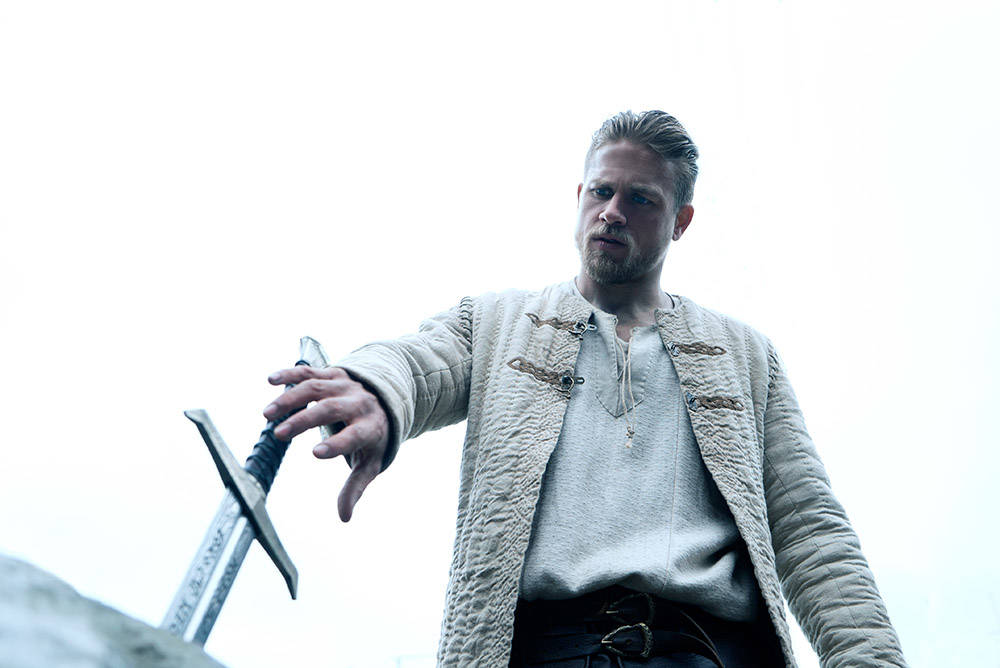It’s easy to pick on something like a celebrity cameo to measure a movie’s hollowness. So if I tell you that soccer god-turned-style icon David Beckham pops up halfway through the new King Arthur: Legend of the Sword, I trust it will stir plenty of anticipatory ridicule. Beckham submits to uglifying makeup scars for his role as some kind of medieval taskmaster here. (Same 21st-century Eurotrash haircut, though.) The thing is, Beckham’s brief appearance is actually one of the livelier moments in King Arthur, especially because it accompanies the celebrated—you might say legendary—moment when Arthur royally yanks a sword from a stone.
If a celeb cameo supplies a highlight in a movie, the movie is probably in trouble. Such is the case with Guy Ritchie’s King Arthur. Ritchie does something unexpected here: Although he broke through to the blockbuster arena by blanding out his style in a couple of Sherlock Holmes movies, he’s gone back to his roots. The bro-centric camaraderie and Brit-lingo of Lock, Stock and Two Smoking Barrels and Snatch is attempted here, as though the knights of the Round Table were just another group of lads deciding where to get the next pint. At one point Arthur swats away a threat from a Viking adversary with a sarcastic, “Yeah, I don’t think so, mate”—not in a Monty Python sending-up-the-genre way, but just for a random laugh.
Ritchie’s film is made almost entirely of effects and sensations. It has no story, very little character development, and almost no women. Ritchie does cast an actress (Astrid Bergès-Frisbey) to occupy the role Merlin usually takes, but you get the feeling this was strictly to get a female face on screen. Charlie Hunnam, fresh from The Lost City of Z, plays Arthur, who grows up in a brothel after having been cast out of Camelot by his wicked uncle Vortigern (Jude Law). When he becomes aware of his birthright, Arthur gathers his chums and decides to avenge the death of his father (Eric Bana) or whatever.
The set pieces include an opening battle with dinosaur-sized elephants, plus a few chances for Arthur to show off his prowess with his sword Excalibur. There’s also a giant snake, but this may be less an actual creature than a piece of witchery on the sorcerer’s part. (I note this as though it matters.) Arthur’s crew of men includes Djimon Hounsou and the compelling Game of Thrones guy Aidan Gillen. As in Ritchie’s early films, all the boys have nicknames, including one called Kung Fu George (Tom Wu), a character who ought to be enjoyable. For all the alleged comradeship meant to convey fun—at times Ritchie seems to be nodding at Robin Hood more than King Arthur—the film is joyless. When Lock, Stock first came out of the British indie world, it suggested that even if Ritchie’s movies might be light on nutrition, they at least would carry some invention. However short the director’s attention span, he looked like someone who could design a colorful playpen. King Arthur has a consistent look—Lord of the Rings meets biker gang meets H.R. Giger—but not much else.
Beyond its amusing trick shots and mythic landscapes, King Arthur feels empty—you start to yearn for rank sentimentality, or anything that would give a scene traction. Instead, Ritchie can’t even wait for the next sequence to begin; he loves to intercut the planning of an event with its actual execution, an editing style that gets diminishing returns. The one time Ritchie’s hyperactive camera nails an expressive function is when it stops traveling for a moment and looks straight down from overhead to reveal a large communal table in the making. The table, though still needing a few pie-shaped pieces, is round. This reminder that we are watching a King Arthur picture comes as a jolt—an echo of an outmoded form of storytelling otherwise demolished by the movie’s hammering frenzy. King Arthur, Rated PG-13. Opens Thurs., May 11 at various locations.
film@seattleweekly.com






